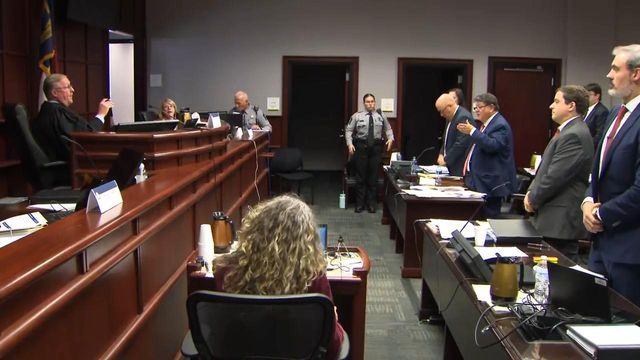NC judges give Cooper partial victory over legislative Republicans in separation of powers court case
A three-judge panel blocked legislative appointments to three major state boards Wednesday, giving Democratic Gov. Roy Cooper a partial — and potentially temporary — win in his latest power struggle with the General Assembly's Republican majority.
The legislature voted earlier this year to take some of the appointments from the governor's office and make other changes that Cooper argues amount to an unconstitutional power grab. A panel of two Republican judges and one Democrat agreed with the governor when it comes to three of those boards: the State Board of Transportation, the Commission for Public Health and the Economic Investment Commission, which approves multimillion-dollar state grants for businesses that promise to create jobs.
The judicial panel, after hearing arguments Wednesday morning, blocked Republican appointments to those three boards, at least while Cooper's lawsuit runs its course, which may take months. In granting the preliminary injunction, the panel decided Cooper would likely win his case and prove the General Assembly's changes to those boards unconstitutional.
The panel wasn't convinced on appointments shifts to other boards, though, and declined to block new appointments to the Environmental Management Commission or the Coastal Resources Commission. Cooper's legal team said it might appeal that decision. A Cooper spokesman said in a statement that the governor's office believed the judges were wrong to leave these boards out of their order.
The judges delayed any decision on two other boards — the N.C. Wildlife Resources Commission and the state Building Code Council — because the changes are set to take effect until 2025 and likely won't need to be blocked while the case winds its way through the courts system.
All the appointment changes, and others, were included Senate Bill 512 and House Bill 488, which passed the Republican-controlled General Assembly this year over Cooper's vetoes.
The heart of the argument over the laws is whether Republican lawmakers, in nibbling at the governor’s power, went too far and violated separation of powers rules embedded in North Carolina’s constitution, which says the General Assembly passes laws, but the executive branch enforces them.
“They seek to make the law and enforce the law,” Jim Phillips, one of Cooper’s lawyers in the case, said during oral arguments Wednesday. “And that is what our [constitution’s] framers warned against time and again.”
Matthew Tilley, a lawyer for the legislature’s Republican majority, said the case requires judges to consider the boards involved in the suit one at a time, partly because the governor’s authority differs with each board and partly because the legislature morphed each board in a different way.
Tilley also said it’s the legislature’s responsibility to check the governor’s power.
“The governor does not have unfettered ability to set policy,” he said this morning.
Cooper and his Republican predecessor, Pat McCrory, have won lawsuits similar to this one in the past against the General Assembly’s Republican majority. Tilley told the three-judge panel that the bills were "carefully crafted" to meet precedents set by the previous cases.
In last year’s elections voters flipped control of the state Supreme Court, which now has a 5-2 Republican majority. And current state Supreme Court Justice Paul Newby, a Republican, wrote the lone dissenting opinion in a key precedent at issue in this new case.
As chief justice, Newby picked the panel that heard Cooper's case Wednesday. In addition to Dunlow, Superior Court judges Paul Holcombe and Dawn Layton are presiding over the case. Dunlow and Holcombe are Republicans. Layton is a Democrat. The trio asked few questions during the morning’s two-hour session.













